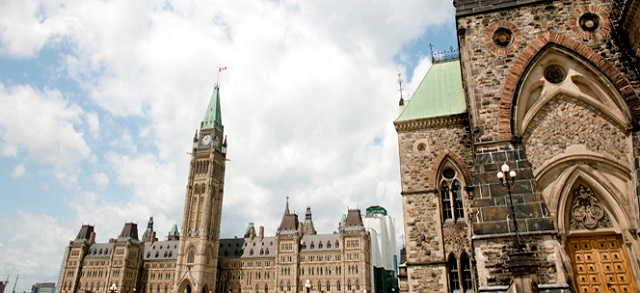Business
Federal bureaucrats spend $76,000 a month renting art taxpayers have already bought

From the Canadian Taxpayers Federation
By Ryan Thorpe
“Can someone in government explain why taxpayers are being sent a bill so bureaucrats can decorate their offices with artwork that taxpayers have already bought and paid for?”
When bureaucrats hang art in their offices, taxpayers are on the hook – twice.
First, the government uses tax dollars to purchase artwork for its Art Bank. Then bureaucrats rent out that artwork and send the bill to taxpayers.
And that art bill comes to millions of dollars.
“Can someone in government explain why taxpayers are being sent a bill so bureaucrats can decorate their offices with artwork that taxpayers have already bought and paid for?” asked Franco Terrazzano, CTF Federal Director. “This is an outrageous waste of money and, to add insult to injury, the government is double billing taxpayers for artwork we’ll never see.”
The Canadian Taxpayers Federation obtained access-to-information records detailing all art rentals made by federal departments and agencies from the Canada Council for the Arts’ Art Bank between January 2016 and July 2024.
During that time, federal departments and agencies racked up $7,808,827 in art rentals.
That means since Prime Minister Justin Trudeau came to power, federal bureaucrats have been spending an average of $76,000 a month renting artwork for their offices.
“Every month, federal bureaucrats spend more money renting art than what the average Canadian earns in an entire year,” Terrazzano said. “It’s amazing that we need to say this, but maybe these bureaucrats could ease up at the taxpayer-funded Art Bank when record numbers of Canadians are lined up at food banks.”
Last year, the average Canadian worker made less than $70,000, according to data from Statistics Canada. In March 2024, Canada saw a record high two million visits to food banks, according to Food Banks Canada.
Federal departments and agencies made 1,445 rentals from the Art Bank between January 2016 and July 2024, according to the records.
The highest single rental came in April 2020, when a federal department or agency expensed $120,240 in artwork to taxpayers.
The records obtained by the CTF do not specify which federal departments or agencies expensed the art rentals.
The Art Bank contains more than 17,000 works of art from more than 3,000 artists, according to the CCA website.
“The Art Bank has the largest collection of contemporary Canadian art anywhere,” according to the CCA. “It houses paintings, sculptures, drawings, photographs and prints by emerging and established artists.”
The CCA is a federal Crown corporation, which dishes out hundreds of millions in grants to artists and arts organizations every year. In 2023-24, CCA grants totalled more than $300 million.
In 2022-23, the CCA received $423 million in federal funding, which accounts for about 90 per cent of the agency’s revenue.
So taxpayers not only foot the bill for this artwork through parliamentary appropriations to the CCA, but also get hit with a secondary expense when that artwork is later rented by a federal department or agency.
In Budget 2023, the government promised to find savings in the Crown corporations.
“The government will also work with federal Crown corporations to ensure they achieve comparable spending reductions, which would account for an estimated $1.3 billion over four years,” according to Budget 2023.
“Bureaucrats billing taxpayers $76,000 a month in art rentals is outrageous at the best of times, but with the government more than $1 trillion in debt and so many Canadians struggling, it’s utterly inexcusable,” Terrazzano said. “The government said it would find savings at Crown corporations, so defunding the Canada Council for the Arts is a perfect place to start.”
Federal departments and agencies expensing art rentals isn’t the only way taxpayers are hit with big bills so government officials can decorate their offices.
In July 2023, the CTF reported 52 Canadian Senators expensed $514,616 in art rentals to taxpayers since 2016.
2025 Federal Election
Alcohol tax and MP pay hike tomorrow (April 1)

The Canadian Taxpayers Federation is calling on all party leaders to stop a pair of bad policies that are scheduled to happen automatically on April 1: pay raises for members Parliament and another alcohol tax increase.
“Party leaders owe taxpayers answers to these two questions: Why do you think you deserve a pay raise and why should Canadians pay higher taxes on beer and wine?” said Franco Terrazzano, CTF Federal Director. “Politicians don’t deserve a raise while millions of Canadians are struggling.
“And the last thing Canadians need is another tax hike when they pour a cold one or uncork a bottle with that special someone.”
MPs give themselves pay raises each year on April 1, based on the average annual increase in union contracts with corporations with 500 or more employees.
The CTF estimates tomorrow’s pay raise will amount to an extra $6,200 for backbench MPs, $9,200 for ministers and $12,400 for the prime minister, based on contract data published by the federal government.
After tomorrow’s pay raise, backbench MPs will receive a $209,300 annual salary, according to CTF estimates. A minister will collect $309,100 and the prime minister will take home $418,600.
Meanwhile, the alcohol escalator automatically increases excise taxes on beer, wine and spirits every year on April 1, without a vote in Parliament. Alcohol taxes will increase by two per cent tomorrow, costing taxpayers about $40 million this year, according to Beer Canada estimates.
The alcohol escalator tax has cost taxpayers more than $900 million since it was imposed in 2017, according to Beer Canada estimates.
“Politicians are padding their pockets on the same day they’re raising beer taxes and that’s wrong,” Terrazzano said. “If party leaders want to prove they care about taxpayers, they should stop the MP pay raises.
“And if party leaders care about giving Canadian brewers, distillers and wineries a fighting chance against tariffs, it’s time to stop hitting them with alcohol tax hikes year after year.”
The CTF released Leger polling showing 79 per cent of Canadians oppose tomorrow’s MP pay raise.
2025 Federal Election
Poilievre To Create ‘Canada First’ National Energy Corridor

From Conservative Party Communications
Poilievre will create the ‘Canada First’ National Energy Corridor to rapidly approve & build the infrastructure we need to end our energy dependence on America so we can stand up to Trump from a position of strength.
Conservative Leader Pierre Poilievre announced today he will create a ‘Canada First’ National Energy Corridor to fast-track approvals for transmission lines, railways, pipelines, and other critical infrastructure across Canada in a pre-approved transport corridor entirely within Canada, transporting our resources within Canada and to the world while bypassing the United States. It will bring billions of dollars of new investment into Canada’s economy, create powerful paycheques for Canadian workers, and restore our economic independence.
“After the Lost Liberal decade, Canada is poorer, weaker, and more dependent on the United States than ever before,” said Poilievre. “My ‘Canada First National Energy Corridor’ will enable us to quickly build the infrastructure we need to strengthen our country so we can stand on our own two feet and stand up to the Americans.”
In the corridor, all levels of government will provide legally binding commitments to approve projects. This means investors will no longer face the endless regulatory limbo that has made Canadians poorer. First Nations will be involved from the outset, ensuring that economic benefits flow directly to them and that their approval is secured before any money is spent.
Between 2015 and 2020, Canada cancelled 16 major energy projects, resulting in a $176 billion hit to our economy. The Liberals killed the Energy East pipeline and passed Bill C-69, the “No-New-Pipelines” law, which makes it all but impossible to build the pipelines and energy infrastructure we need to strengthen the Canadian economy. And now, the PBO projects that the ‘Carney cap’ on Canadian energy will reduce oil and gas production by nearly 5%, slash GDP by $20.5 billion annually, and eliminate 54,400 full-time jobs by 2032. An average mine opening lead time is now nearly 18 years—23% longer than Australia and 38% longer than the US. As a result of the Lost Liberal Decade, Canada now ranks 23rd in the World Bank’s Ease of Doing Business Index for 2024, a seven-place drop since 2015.
“In 2024, Canada exported 98% of its crude oil to the United States. This leaves us too dependent on the Americans,” said Poilievre. “Our Canada First National Energy Corridor will get us out from under America’s thumb and enable us to build the infrastructure we need to sell our natural resources to new markets, bring home jobs and dollars, and make us sovereign and self-reliant to stand up to Trump from a position of strength.”
Mark Carney’s economic advice to Justin Trudeau made Canada weaker while he and his rich friends made out like bandits. While he advised Trudeau to cancel Canadian energy projects, his own company spent billions on pipelines in South America and the Middle East. And unlike our competitors Australia and America, which work with builders to get projects approved, Mark Carney and Steven Guilbeault’s radical “keep-it-in-the-ground” ideology has blocked development, killed jobs, and left Canada dependent on foreign imports.
“The choice is clear: a fourth Liberal term that will keep our resources in the ground and keep us weak and vulnerable to Trump’s threats, or a strong new Conservative government that will approve projects, build an economic fortress, bring jobs and dollars home, and put Canada First—For a Change.”
-

 Business1 day ago
Business1 day agoDOGE discovered $330M in Small Business loans awarded to children under 11
-

 COVID-191 day ago
COVID-191 day ago17-year-old died after taking COVID shot, but Ontario judge denies his family’s liability claim
-

 Economy2 days ago
Economy2 days agoSolar and Wind Power Are Expensive
-

 2025 Federal Election1 day ago
2025 Federal Election1 day agoThe High Cost Of Continued Western Canadian Alienation
-

 Business2 days ago
Business2 days agoWhy a domestic economy upgrade trumps diversification
-

 Business2 days ago
Business2 days agoAll party leaders must oppose April 1 alcohol tax hike
-

 Daily Caller1 day ago
Daily Caller1 day agoCover up of a Department of Energy Study Might Be The Biggest Stain On Biden Admin’s Legacy
-

 Economy2 days ago
Economy2 days agoClearing the Path: Why Canada Needs Energy Corridors to Compete






